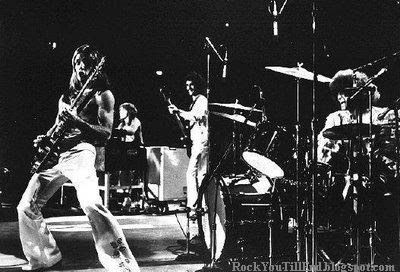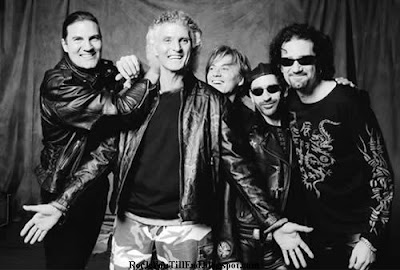Easy Guitar Tabs GFR
Terry Knight and The Pack
The story of Grand Funk Railroad begins in the 1960's, the place is the working class, auto industry town of Flint, Michigan.
Richard Terrance Knapp (who later changed his name to Terry Knight) was a popular Flint / Detroit disc jockey. He soon tired of radio, and decided to enter the music end of the business.
Terry dee-jayed at record hops with a local band named "The Jazz Masters", which consisted of Don Brewer (drums), Al Pippins (guitar), Bob Caldwell (keyboards), and Herm Jackson (bass). Soon he asked to join the band as lead singer. Because of his radio connections, the band readily agreed. To sound more "English", they renamed themselves "The Pack".
Richard Terrance Knapp (who later changed his name to Terry Knight) was a popular Flint / Detroit disc jockey. He soon tired of radio, and decided to enter the music end of the business.
Terry dee-jayed at record hops with a local band named "The Jazz Masters", which consisted of Don Brewer (drums), Al Pippins (guitar), Bob Caldwell (keyboards), and Herm Jackson (bass). Soon he asked to join the band as lead singer. Because of his radio connections, the band readily agreed. To sound more "English", they renamed themselves "The Pack".
After about a year, they developed a large following, and became known as "Terry Knight and The Pack". Herman Jackson was drafted, and was replaced by a local kid named Mark Farner.

Grand Funk Railroad
Grand Funk Railroad
In 1968, Mark and Don decided to leave and form a new band of their own. They recruited ? and The Mysterians bass player Mel Schacher, and renamed themselves "Grand Funk Railroad", inspired by a Michigan landmark, "The Grand Trunk Western Railroad". Terry Knight then became their Manager.
After a wildly successful performance at the Atlanta Pop Festival on July 4, 1969, the band landed a recording contract with Capitol Records. In 1970 they had sold more albums than any other American band, and went on to break the Beatles' record at Shea Stadium in 1971, selling it out in 72 hours.
Sometime during/after the recording of E Pluribus Funk, it was decided to replace Terry Knight with Andy Cavaliere as Manager. The next few years were spent in litigation over the rights to the name "Grand Funk Railroad" and song royalties. The band got to keep their name, but little else.
After a wildly successful performance at the Atlanta Pop Festival on July 4, 1969, the band landed a recording contract with Capitol Records. In 1970 they had sold more albums than any other American band, and went on to break the Beatles' record at Shea Stadium in 1971, selling it out in 72 hours.
Sometime during/after the recording of E Pluribus Funk, it was decided to replace Terry Knight with Andy Cavaliere as Manager. The next few years were spent in litigation over the rights to the name "Grand Funk Railroad" and song royalties. The band got to keep their name, but little else.
During this time, the band recorded the album "Phoenix", which they produced themselves, and added a keyboardist, former "Fabulous Pack" member, Craig Frost. Although not yet an official member, Craig added an extra element into the GFR sound, which would continue for the remainder of the 1970's.
The American Band
The next two albums, "We're An American Band" and "Shinin' On", produced by Todd Rundgren, would introduce GFR to the AM radio audience, and begin a succession of top 40 hits.
Jimmy Ienner (Raspberries, Kiss, Three Dog Night) produced their next few albums, including the final Capitol release "Born to Die", which many thought would be the last GFR album.
One more album was recorded with the original members on MCA records. "Good Singin' Good Playin' ", produced by Frank Zappa, and is considered their finest by many fans. (GSGP was remastered and issued on CD in January 1999.)
Jimmy Ienner (Raspberries, Kiss, Three Dog Night) produced their next few albums, including the final Capitol release "Born to Die", which many thought would be the last GFR album.
One more album was recorded with the original members on MCA records. "Good Singin' Good Playin' ", produced by Frank Zappa, and is considered their finest by many fans. (GSGP was remastered and issued on CD in January 1999.)
 Grand Funk Railroad naked
Grand Funk Railroad nakedSolo Careers
Mark went on to record two solo albums, while Don Brewer, Mel Schacher and Craig Frost continued on as "Flint" and recorded two albums.
In the early 1980's, Mark and Don reformed and teamed up with Flint musician Dennis Bellinger (replacing Mel on bass) to record two more Grand Funk albums, this time on the Warner Brothers label, Full Moon.
Mark resumed his solo career after the band called it quits in 1983, recording three Christian albums. Don followed Craig and joined Bob Seger's Silver Bullet Band, and Mel opened a record store.
The Reunion
In 1995, Mark was asked to join Ringo Starr's All Starr Band and toured that year. In 1996, Mark, Don and Mel decided to go out and play a few "Reunion" concerts to see if there was still interest in Grand Funk Railroad. The 14 show "mini tour" was successful and the band decided to reunite. Howard Eddy Jr. was added as a sideman on keyboards, rhythm guitar, and background vocals.
Teaming up with Ringo Starr's Promoter, David Fishof, the band played three sold out Bosnia benefit concerts in 1997, released a new live album titled "Bosnia" (which proceeds went to benefit the orphans of war torn Bosnia) then continued to tour throughout 1998 under the management of Bobby Roberts and Jim Della Croce.
Grand Funk Railroad reunited a total of 3 years and toured extensively from 1996 to 1998. Their 1998 tour was listed in Pollstar's Top 100 Shows and was also listed as one of the top grossing tours of 1998.
The 1976 Frank Zappa produced album "Good Singin' Good Playin'" was remastered and reissued on CD in January 1999, VH-1 filmed a "Behind the Music" special about the band which first aired in March 1999, and Capitol Records released GFR's Anthology "Thirty Years of Funk" on June 29, 1999.

Grand Funk Railroad 2007
Grand Funk Railroad mp3 download
Easy Guitar Tabs GFR
No comments:
Post a Comment